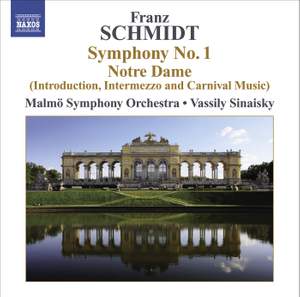Franz Schmidt - Symphony No. 1
Malmö Symphony Orchestra, Vassily Sinaisky
Despite some celebrated past recordings, Franz Schmidt's symphonies have never quite made it into the musical premier league. It is not through lack of championship nor the quality of the works... — More…
CD
$13.25Downloads
What are FLAC and MP3?Contents
Schmidt, F: Symphony No. 1 in E major
Work length45:31
$12.00
$15.40
$21.00
- Malmö Symphony Orchestra
- Vassily Sinaisky
I. Sehr langsam - Sehr lebhaft
Track length11:38
$3.00
$3.85
$5.25
II. Langsam
Track length11:27
$3.00
$3.85
$5.25
III. Schnell und leicht
Track length11:34
$3.00
$3.85
$5.25
IV. Lebhaft, doch nicht zu schnell
Track length10:52
$3.00
$3.85
$5.25
Schmidt, F: Notre Dame, Op. 2, Act I
Work length15:19
$3.00
$3.90
$5.25
- Malmö Symphony Orchestra
- Vassily Sinaisky
Introduction
Track length4:29
$1.00
$1.30
$1.75
Intermezzo
Track length4:59
$1.00
$1.30
$1.75
Carnival Music
Track length5:51
$1.00
$1.30
$1.75





